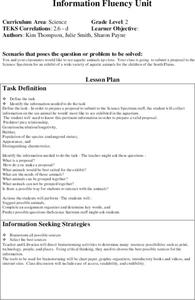Sargent Art
Protect Our Marine Life
Encourage water conservation and boost art skills with a hands-on activity that challenges young painters to create a scene highlighting marine life. Using oil pastels, scholars draw an underwater scene and write a tip for viewers to...
Curated OER
Number Search in Monterey Bay Aquarium
Youngsters search for an animal with body parts for each number from one to ten during a field trip to an aquarium. They count rays, fins, feet, gills, eyes, spots or anything. When they get back to the classroom, they compile their...
Curated OER
Marine Life: Anatomy of a Humpback
Third graders prepare for a trip to view marine life. In this science lesson plan, 3rd graders assemble a picture of a Humpback whale on a grid.
Curated OER
Exploring Marine Ecosystems in the Caribbean and Maine
Students compare the marine habitats of Maine and the Caribbean using temperature, tides, ocean currents, latitude and longitude. In this marine ecosystems lesson, students analyze maps to complete graphic organizers that evaluate the...
Curated OER
Aquarium Acrobats
Students create a realistic underwater diorama as a follow-up activity to a field trip to an aquarium. They research and discuss sea creatures and plants that contribute to aquarium life, then create a diorama using research information...
Curated OER
Invisible Life
By setting up an aquarium in the classroom, learners are able to describe some macroscopic and microscopic organisms that are found inside. This well-designed, and educationally rich instructional activity requires pupils to use...
ReadWriteThink
Webcams in the Classroom: Animal Inquiry and Observation
Boost observational skills with an inquiry-based lesson that takes scholars on a virtual field trip. With help from webcams, learners observe animals in a zoo or aquarium. Observations go into a journal and a discussion is held to review...
Curated OER
Let's Learn about Fish
Students explore fish. In this aquatic life science lesson, students complete a KWL chart about fish, listen to What's it Like to be a Fish?, and observe a classroom aquarium or take a trip to a local aquarium. Students complete an...
Curated OER
Information Fluency Unit
Second graders create a proposal for the Science Spectrum to have an exhibit of a wide variety of aquatic animals for the children of the South Plains. These students would like to see aquatic animals up close.
Curated OER
Ocean Exploration: Dentists of the Sea!
Students watch videos about unusual fish behavior and write to marine scientists about the proper care of fish. In this fish lesson plan, students watch the videos on how to properly transfer fish to saltwater, and they do so in an...
Curated OER
Busy Otters
Students prepare for a trip to an aquarium by identifying otters, their body parts and behaviors as they read "Pup's Supper", do an otter pantomime and make a puppet. After their field trip, they complete a Venn Diagram of Otter behaviors.
Curated OER
We're All In This Together
Students discover what a coral reef is and the animals that live there. In this ecosystem lesson, students act out a story with ocean organisms. They answer questions that show the interdependency of the sea animals.
Curated OER
environment: Fresh and Saltwater Habitats
Students compare and contrast fresh and salt water coastal environments. After describing how sea animals adapt to their habitats, they design a variety of sea creatures and explain how the adaptations aid in the animals' survival. ...
Curated OER
A Rainbow Under the Sea: How Do Animals Survive in the Ocean?
Second graders, with adult help, create a PowerPoint presentation on a selected ocean animal.
Curated OER
Brine Shrimp
Learners gain a sense of the delicacy and complexity of a living organism and the rather narrow range of conditions under which it can live.
Curated OER
Building an Underwater Habitat
Young scholars investigate underwater habitats. In this underwater habitat instructional activity, students study Aquarius and design their own underwater habitat that can sustain life. Young scholars work in groups and present their...
Curated OER
Microfishing
Students use a simple method to collect living microorganisms from natural and/or artificial environments and develop skills in microscopy, observation, drawing, speculation, hypothesizing, oral presentation, and raising questions.
Curated OER
Myth-try Cards Activity
Students read creation myths to learn various cultural explanations for natural phenomena. They select sharks and write myths to explain physical structures, behaviors or roles in ecosystems. They research the animals to provide...
Curated OER
You...Instead of the Onion Skin
Learners observe their own epithelial cells from the inside linings of their cheeks using DigiScope technology. They prepare a slide with both onion cells and epithelial cells and make an illustrated booklet for a PowerPoint presentation...
Curated OER
What is Coral?
Students discuss what they know about coral reefs and are introduced to the importance of preserving coral reefs. In this coral reef lesson plan, students make connections between coral ecology in the classroom and in the real...
Curated OER
CREATE A CAVE
Students investigate the concept of caves by conducting an experiment. The lesson contains background information for the teacher. They collect data while making observations and write a review of the concept once the experiment is...






















